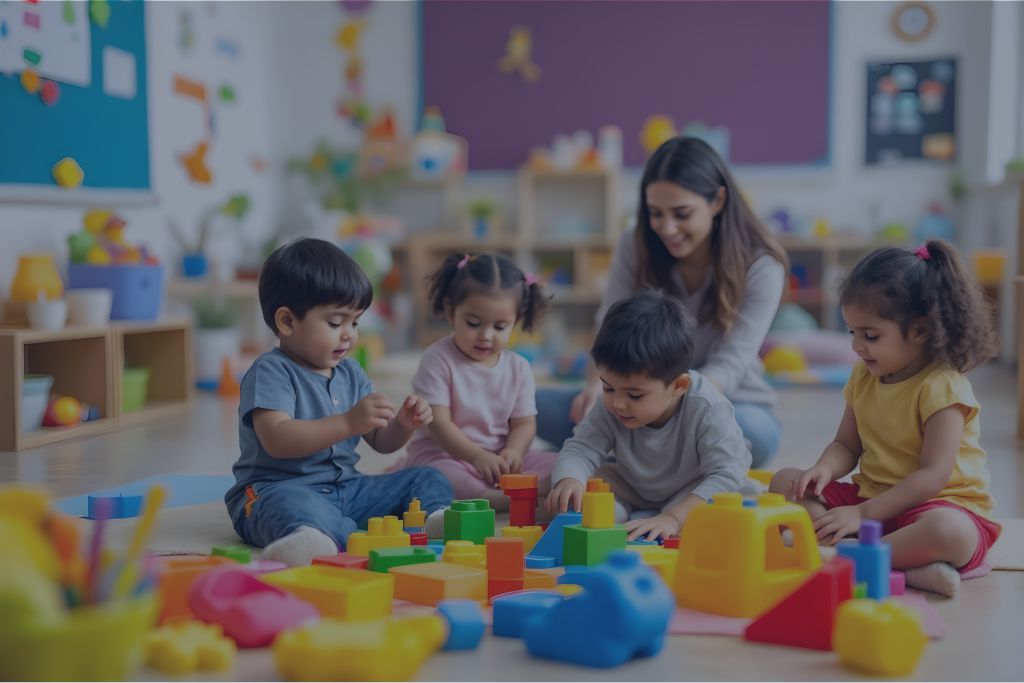In the early years of a child’s life, learning isn’t confined to textbooks or structured lessons—it’s often the most natural and effective when it happens through play. Play-based learning is an educational approach where children engage in play as a primary way of exploring, learning, and understanding the world around them. For preschoolers, play is not just a fun activity; it’s a critical tool for cognitive, emotional, social, and physical development.
In this blog, we’ll explore why play-based learning is so important for preschoolers, how it nurtures essential skills, and how parents and educators can support this kind of learning in early childhood education.
What Is Play-Based Learning?
Play-based learning is an approach that encourages children to explore, experiment, and engage with their environment in a playful manner. Rather than sitting at a desk or completing worksheets, preschoolers learn through hands-on experiences, such as role-playing, building with blocks, drawing, singing, or exploring nature.
The key to play-based learning is that it is child-directed—children choose what they are interested in and engage with it at the
1. Fosters Creativity and Imagination
One of the most significant benefits of play-based learning is that it encourages creativity and imagination. When preschoolers engage in pretend play or storytelling, they are developing their ability to think outside the box, explore different scenarios, and invent new ideas.
- Dramatic play, such as pretending to be a doctor, teacher, or chef, allows children to practice different roles and understand the world from various perspectives. This form of play helps build creativity by letting children shape their own stories and ideas.
- Art activities, like painting or sculpting with clay, give children the opportunity to express themselves and develop an appreciation for creative expression.
2. Develops Social Skills and Emotional Intelligence
Play-based learning is also essential for helping children build social skills and emotional intelligence. When children play together, they learn how to navigate social dynamics, share resources, and solve conflicts.
- Cooperative play helps children learn important interpersonal skills, such as taking turns, working as a team, and compromising. For example, when children build a tower together or pretend to run a restaurant, they practice communication and collaboration.
- Emotional regulation is also learned through play. When a child faces a problem or frustration during play (like a tower collapsing or not getting a turn), they learn how to manage their emotions, seek help, and practice patience. These experiences are vital for emotional development and resilience.
- Play offers children an opportunity to explore different emotions, whether it’s excitement, disappointment, or joy, and understand that all feelings are normal. This fosters emotional intelligence and self-awareness.
3. Enhances Language and Communication Skills
Language development is a cornerstone of preschool education, and play is one of the most effective ways to enhance a child’s vocabulary, comprehension, and communication skills.
- Storytelling and role play: When children engage in pretend play, they use language to create narratives, dialogue, and scenarios. For example, playing “house” or “school” allows them to practice using new words, ask questions, and articulate their thoughts and feelings.
- Building vocabulary: Activities such as reading books, singing songs, and talking through problems during play help expand a child’s vocabulary. Teachers and caregivers can introduce new words through play, helping children make connections between words and their meanings in a fun and natural way.
- Non-verbal communication: Play also helps children develop non-verbal communication skills, such as body language, facial expressions, and gestures, which are just as important as spoken language in forming social connections.
By making language an integral part of play, children not only learn words but also develop the ability to use them effectively in social contexts.

4. Encourages Cognitive and Problem-Solving Skills
Through play, preschoolers develop critical thinking, decision-making, and problem-solving skills. Play-based learning environments often encourage trial and error, helping children understand cause-and-effect relationships and build their cognitive abilities.
- Building with blocks or puzzles: These activities stimulate children’s minds by challenging them to think logically and spatially. When building a structure, they have to plan, balance, and predict how to make their creation stable. This type of play strengthens problem-solving skills and encourages spatial reasoning.
- Exploration and experimentation: Whether through science experiments, cooking activities, or sensory play (like water and sand), children are learning how the world works and making connections between different concepts.
In play, children are free to experiment with their ideas, make mistakes, and try again, all of which are integral to developing critical thinking skills that will benefit them throughout their education and life.
5. Promotes Physical Development and Motor Skills
Physical play is another vital component of play-based learning. It’s not just about running and jumping—play helps preschoolers develop both gross motor skills (large movements) and fine motor skills (small, precise movements).
- Gross motor skills: Outdoor play, running, climbing, and dancing help children strengthen muscles and improve coordination, balance, and agility. Activities like playing tag or riding a tricycle enhance children’s overall physical fitness and motor control.
- Fine motor skills: Tasks like drawing, cutting with scissors, building with small blocks, or threading beads help children refine their hand-eye coordination and finger dexterity. These skills are crucial for later tasks such as writing, using utensils, and dressing independently.
Play allows children to practice and strengthen these physical skills in an engaging, enjoyable way, making them an integral part of early childhood development.
6. Nurtures a Love of Learning
Perhaps one of the most valuable aspects of play-based learning is its ability to instill a love of learning in young children. Because play is inherently fun, it motivates children to explore new things and remain curious about the world around them.
- Engaged learning: When children are playing, they are actively engaged in the process. This intrinsic motivation leads to deeper learning because children are naturally curious and invested in discovering new things on their own terms.
- Building confidence: As children engage in play and succeed in their activities—whether it’s building a tower that doesn’t fall or completing a puzzle—they gain confidence in their abilities. This boosts their self-esteem and encourages them to tackle new challenges with enthusiasm.
When children experience the joy of learning through play, they carry that excitement into their later educational experiences.
How Parents and Educators Can Support Play-Based Learning
While play is naturally an essential part of every child’s day, parents and educators can take a proactive role in supporting and enhancing play-based learning:
- Create a stimulating environment: Offer a range of materials, such as art supplies, building blocks, books, and sensory play objects, to encourage different types of play. A rich, diverse environment promotes exploration and creativity.
- Be involved but not controlling: Allow children to lead their play and explore their interests. Offer gentle guidance and ask open-ended questions to spark their imagination but avoid dictating the direction of their play.
- Encourage social interaction: Organize group activities and provide opportunities for children to engage with their peers. Social play, such as group games or collaborative building projects, helps develop communication and cooperation skills.
- Provide time for unstructured play: Allow children to have free time to engage in unstructured play. This gives them the freedom to make their own choices, explore their interests, and develop independence.
Conclusion
Play-based learning is much more than just fun—it’s a powerful tool for supporting preschoolers’ development across all domains. By encouraging play in early childhood education, we create an environment where children can grow intellectually, emotionally, socially, and physically. Play-based learning fosters creativity, builds essential life skills, and instills a love for learning that will serve children well throughout their educational journey.
As parents and educators, we can help children thrive by supporting play-based learning at home and in the classroom. The more we recognize and embrace the power of play, the more we empower children to become confident, curious, and capable learners who are prepared for the challenges of the future.

